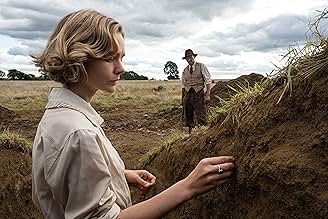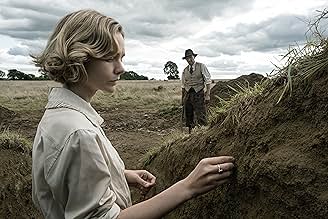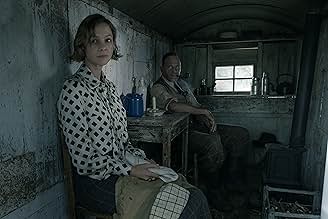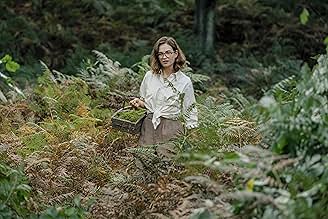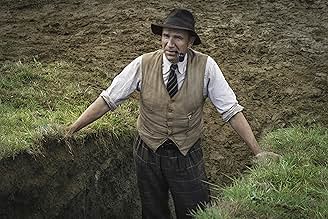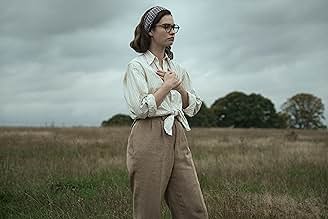Na iminência da Segunda Guerra Mundial, uma viúva abastada contrata um arqueólogo amador para escavar os túmulos de sua propriedade.Na iminência da Segunda Guerra Mundial, uma viúva abastada contrata um arqueólogo amador para escavar os túmulos de sua propriedade.Na iminência da Segunda Guerra Mundial, uma viúva abastada contrata um arqueólogo amador para escavar os túmulos de sua propriedade.
- Indicado para 5 prêmios BAFTA
- 3 vitórias e 11 indicações no total
- Direção
- Roteiristas
- Elenco e equipe completos
- Produção, bilheteria e muito mais no IMDbPro
Avaliações em destaque
This is a very good movie..if you see the picture from the outside you'll say it's a story about an Archeologist and his historically important excavation..but if you dig deeper you'll find a lot of potential in what the movie is trying to tell you.
The relationships between us and the people we love,the people we don't even know..heck between people in general and how it's important to a human being..but that comes with a misunderstandings and conflicts and this happening in a time of war and how that is affecting them..all this has been told in an amazing dramatic way of Brasil Brown who discovered and excavated one of the most important archaeological discoveries of all time of course with that being the main story.
The acting by Carey Mulligan was magnificent and Ralph Fiennes was the one for this role and their performance was the outstanding thing in the whole movie.
Another thing was good is the editing..they've done a tremendous job and it was really worth the effort to come up with something like this.
Although sometimes there are some side stories that you'll find yourself not that interested in them too much,and the storytelling could seem very slow at some points..also there's ups and downs like any other movie.
Overall great movie,worth watching and i suggest you to see it.
An intriguing little piece of British history, The Dig tells a slow-burning story with understated and genuine drama throughout, turning what could have been a rather dry tale of archaeology into a genuinely gripping character drama. Its historical context takes a little while to become fully relevant, but ultimately, The Dig really proves itself as a captivating watch.
One of the things that I really liked about The Dig was its patience. Never dragging yet never rushing, the film takes its time to build up all of its main strengths, from its characters, their emotional back stories, and the overarching historical context of the outbreak of World War II.
Complete with elegant camerawork, a beautiful score and impressively atmospheric direction that makes it an eye-catching watch from the first few moments, The Dig has enough confidence and depth to keep you engrossed even if its story isn't advancing apace, something that's a lot harder to pull off than you may think.
One of the big reasons that the film's patient pacing and style work so well is because of its understated, genuine drama. With calm yet fully convincing performances across the board, particularly from Ralph Fiennes and Carey Mulligan, this isn't a showy period drama by any means, but eases you into a story about real people, making them the centre of attention far more than the historical significance of the event.
I'm not particularly well-versed in archaeology, and I didn't know about this discovery before watching this film. I think that might be the case for many other people, but the great thing about The Dig is that it's primarily a character-driven drama, and one that uses emotional intrigue to bring you closer to the story at hand and allow you to appreciate its importance.
One element where the film does seem to falter is in its use of the historical backdrop of the lead-up to World War II. Set in the summer months of 1939 before the outbreak of war, there are sporadic references to the coming conflict through the first two acts of the movie, but they don't seem to bear much relevance to this story about an archaeological find.
However, the film slowly begins to unveil how the historical context plays into its characters' personal lives and the fate of the dig itself, with dramatic focus shifting significantly in the final act, but just at the right point that the sudden arrival of the war into everyday life feels just like what it would have been like to experience it first-hand, taking over everything seemingly normal in an instant.
As a result, while the historical backdrop seems almost contrived at first, it really comes good as the film progresses, another demonstration of how the patience of The Dig really plays into its hands throughout.
One of the things that I really liked about The Dig was its patience. Never dragging yet never rushing, the film takes its time to build up all of its main strengths, from its characters, their emotional back stories, and the overarching historical context of the outbreak of World War II.
Complete with elegant camerawork, a beautiful score and impressively atmospheric direction that makes it an eye-catching watch from the first few moments, The Dig has enough confidence and depth to keep you engrossed even if its story isn't advancing apace, something that's a lot harder to pull off than you may think.
One of the big reasons that the film's patient pacing and style work so well is because of its understated, genuine drama. With calm yet fully convincing performances across the board, particularly from Ralph Fiennes and Carey Mulligan, this isn't a showy period drama by any means, but eases you into a story about real people, making them the centre of attention far more than the historical significance of the event.
I'm not particularly well-versed in archaeology, and I didn't know about this discovery before watching this film. I think that might be the case for many other people, but the great thing about The Dig is that it's primarily a character-driven drama, and one that uses emotional intrigue to bring you closer to the story at hand and allow you to appreciate its importance.
One element where the film does seem to falter is in its use of the historical backdrop of the lead-up to World War II. Set in the summer months of 1939 before the outbreak of war, there are sporadic references to the coming conflict through the first two acts of the movie, but they don't seem to bear much relevance to this story about an archaeological find.
However, the film slowly begins to unveil how the historical context plays into its characters' personal lives and the fate of the dig itself, with dramatic focus shifting significantly in the final act, but just at the right point that the sudden arrival of the war into everyday life feels just like what it would have been like to experience it first-hand, taking over everything seemingly normal in an instant.
As a result, while the historical backdrop seems almost contrived at first, it really comes good as the film progresses, another demonstration of how the patience of The Dig really plays into its hands throughout.
There is a lot I can say about this film, but I'll keep it short.
If you love simple stories being told in a beautiful and clear manner, and if you like Archaeology, then this is the film for you. All of the actors have done a wonderful job.
The Dig (2021) was directed by Simon Stone. It stars Carey Mulligan as Edith Pretty. Mrs. Pretty is a widow who lives on a large estate. She is convinced that there's something of archeological significance on her property. She employ Basil Brown (Ralph Fiennes) to excavate one of the burial mounds. Brown is a skilled and experienced excavator, but he has no formal academic training. The result of his efforts can now be seen in the British Museum.
This could have been a great movie, if director Stone had just worked with what actually happened. Naturally, staff of the local museum wanted to direct the excavation, as did staff of the British museum. There was an inquest to decide the ownership of the find. World War II was (literally) about to begin. A perfect 90-minute movie. However, it ended up being a less-than-perfect 105 minute movie.
That's because director Stone brings in a (fictitious) cousin of Mrs. Pretty and a beautiful young female archeologist married to a stodgy , unromantic male archeologist. (Guess where that goes?) The inquest--an absolutely essential scene about who owns the find--is botched. You have to work backwards to figure out what happened. Worst of all, you never see the dramatic results of the excavation. You can see them in the British Museum, or online, or on a postcard. However, you don't see them in the movie. (Maybe the British Museum didn't like the movie, and refused to give permission.)
All in all, what could have been an excellent movie turned out to be pretty good movie. It's worth seeing as long as you don't expect great things. It works well on the small screen. The Dig has a pretty good rating of 7.3. I agreed, and rated it 7.
This could have been a great movie, if director Stone had just worked with what actually happened. Naturally, staff of the local museum wanted to direct the excavation, as did staff of the British museum. There was an inquest to decide the ownership of the find. World War II was (literally) about to begin. A perfect 90-minute movie. However, it ended up being a less-than-perfect 105 minute movie.
That's because director Stone brings in a (fictitious) cousin of Mrs. Pretty and a beautiful young female archeologist married to a stodgy , unromantic male archeologist. (Guess where that goes?) The inquest--an absolutely essential scene about who owns the find--is botched. You have to work backwards to figure out what happened. Worst of all, you never see the dramatic results of the excavation. You can see them in the British Museum, or online, or on a postcard. However, you don't see them in the movie. (Maybe the British Museum didn't like the movie, and refused to give permission.)
All in all, what could have been an excellent movie turned out to be pretty good movie. It's worth seeing as long as you don't expect great things. It works well on the small screen. The Dig has a pretty good rating of 7.3. I agreed, and rated it 7.
So rare to watch a wonderfully gentle but poignant film. It tugs at the emotions as it tells a largely true. Some liberties are taken with the truth but largely accurate. The real story of Peggy Piggott is fascinating and worth a film in itself. However the real stars of the story are Edith Pretty and Basil Brown portrayed brilliantly by Mulligan and Fiennes. One small criticism is that Carey Mulligan is too young for the part but she carries it off superbly and the performance by Ralph Fiennes is one of the best I have seen in a long time. The whole cast is superb and the backdrop of imminent war is ever present throughout the film. I have visited Sutton Hoo a number of times and studied the excavation and I still marvel at the work Basil Brown did. As an archaeologist myself I can say his work even by today's standards was of the highest order. Many of the academic archaeologists before and after WW2 were useless when it came to excavation and recording it. Basil Brown did everything right and it is fantastic he is at last getting the credit he deserved and that Edith Pretty wanted for him. It is to the great shame of the academic establishment it has taken so long. The film portrays this extremely well.
Você sabia?
- CuriosidadesReimagines the events of the 1939 excavation of Sutton Hoo near Woodbridge, in Suffolk, England. It is the site of two early medieval cemeteries that date from the 6th to 7th centuries. One cemetery had an undisturbed ship burial with a wealth of Anglo-Saxon artifacts. Most of these objects are now held by the British Museum.
- Erros de gravaçãoEdith's son Robert can be seen wearing an aluminium foil hat early in the movie, Aluminium foil did not surface until after the war, but tin foil had existed since the 19th century.
- Citações
Basil Brown: Robert, we all fail. Every day. There are some things we just can't succeed at no matter how hard we try. I know it's not what you want to hear.
- ConexõesFeatured in Jeremy Vine: Episode #4.25 (2021)
- Trilhas sonorasLa Rejouissance (Allegro)
Written by George Frideric Handel
Public Domain
Arranged by Julian Kershaw
Performed by Alder Valley Brass
Principais escolhas
Faça login para avaliar e ver a lista de recomendações personalizadas
- How long is The Dig?Fornecido pela Alexa
Detalhes
- Data de lançamento
- Países de origem
- Central de atendimento oficial
- Idioma
- Também conhecido como
- La excavación
- Locações de filme
- Empresas de produção
- Consulte mais créditos da empresa na IMDbPro
Bilheteria
- Faturamento bruto mundial
- US$ 693
- Tempo de duração1 hora 52 minutos
- Cor
- Mixagem de som
- Proporção
- 2.00 : 1
Contribua para esta página
Sugerir uma alteração ou adicionar conteúdo ausente







